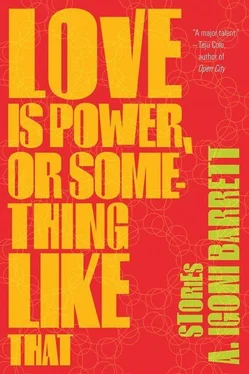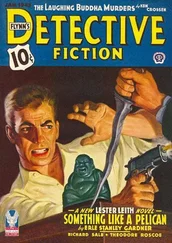He glared at her for some seconds, then nodded and strode into the apartment. Estella followed, not wringing her hands, but looking like she felt the need to. The window blinds were drawn and the TV was on. He walked to the recliner opposite and, with a grunt, sank into it. His arms dangled over the sides.
“Remove your shirt make I hang am,” Estella said.
She waited. His eyes were closed.
“Eghe. .”
“Bring the remote,” he said.
She walked to the TV and returned with the remote control. He raised his hand, wriggled his fingers to indicate that she hand it over, and closed his fist around it without opening his eyes. Pointing from the waist, he began to flip channels. The ashen, electrical light danced across his ebony skin.
“Your shirt, Eghe.”
His eyes snapped open. “Sharrap woman, can’t you see I’m busy?”
Estella wheeled round and strode into the bedroom. She tossed his bag in the corner and dropped onto the bed, disarranging the sheets and gripping her knees through her wrapper. She stared at the wall, her lips moving silently. Then she remembered the meal on the fire. She leaped up and rushed from the room.
Her husband was asleep. His mouth drooped open and a rope of saliva hung down to the steel insignia on his collar. Estella stood in the center of the room and watched the heave and fall of his chest, then walked up to him, sniffed his breath, and began to undo his buttons.

It was Estella’s voice that woke him up. He kicked away the bedclothes and rose; he winced from the weight of his head. He walked to the bedroom door and pulled it open.
“You see — I told you the TV will wake your father. Oya, turn it off now!”
“Ah, Mummy—”
“ Now, can’t you hear?”
Estella was standing in the front doorway, with only her head and part of a shoulder visible through the parted curtain. As his nine-year-old son, Osamiro, shuffled toward the TV set, Eghobamien Adrawus leaped forward and grabbed the boy by the waist. He swept him into the air and whirled him around. Osamiro slapped his father on the head, then took hold of his ears. He shrieked with laughter when his father thrust his tongue into his belly button and made snorting, wallowing-pig noises.
“Me too, Daddy, me too!” said six-year-old Ododo, tugging at his father’s underpants.
Eghobamien Adrawus allowed himself to be wrestled to the floor. He bellowed in mock pain when Osamiro, his thin knees straddling his belly, blew a gust of air into his ear. Clutching the struggling boy to his chest with one arm, he reached out and pulled Ododo into the fray.
Estella struggled to suppress a smile. “You men, I just arranged the house. I hope you will clean up after you finish this nonsense play?” Pulling back her head from the doorway, she asked: “Eghe — you don ready for your food?”
“Yes!” Eghobamien Adrawus gasped in reply, as he writhed under his sons’ tickling fingers. Then: “Enough, enough! I surrender!”
“True?” Ododo queried, his hand still buried in his father’s armpit.
“True,” Eghobamien Adrawus said. “You win. Oya go. . go and watch cartoon.”
“ Yay!” the boys yelled in unison. They sprang from their father’s chest and raced for possession of the recliner and remote. Eghobamien Adrawus rose from the floor, arranging his Y-fronts.
Estella was stirring the contents of the pot on the stove. The steam from her cooking shrouded her scowl of concentration. “I dey warm am, e go soon ready,” she said when her husband emerged from the apartment. He nodded and patted her on the rump. The neighbor’s dirty pot was still festering beside the doorway. With cautious casualness, so that his wife wouldn’t notice, he shuffled toward Mama Adaobi’s door to check if she had returned, but as it was still padlocked, he strolled to the balcony for some air.
With his elbows on the balustrade, Eghobamien Adrawus gazed out over the chaos of Poteko City. Three floors below, the earth seemed to pull at him. The rooftops were a sea of rust, with the masts of an armada of sunken TVs jutting from it. The heads of passersby bobbed like buoys. Across the road, in a clump of goat-shit-green bushes, he noticed the splayed carcass of a dog. His gaze traveled and landed on the hive of activity that was the bus stop. The commercial buses were back, their overripe-banana color marking them out. When he heard footsteps behind him, he turned.
“Your food don ready,” Estella said.
She gave off the smell of kerosene smoke, and a film of moisture lay on her skin. Despite long years of marriage, he still marvelled at her small size, her compactness. Her head, her neck, her arms, her feet, everything was molded in a way that overpowered him. As if she was made for a more perfect place.
“You say something?” Estella glanced up and caught her husband’s eyes. “Eghe, no!” she said, backing away. “Make you eat first.”
“No. I wan’ eat you.” He reached out to take her hand but she slapped him away. She spun round and strode toward the corridor, her hips swinging. He caught up with her in the doorway and clasped her by the waist.
“I want you, now, now, now.” He tried to trap her mouth but his lips skidded off her cheek. She laughed and wriggled away. “The children—”
“Wetin happen to them?”
“If they see us— Eghe! ”
He lifted her off her feet and threw her across his right shoulder. He pinned her kicking legs with one arm. “Make they see,” he growled, smacking her upended bottom. “They go know sey their papa love their mama.”

With a groan, Eghobamien Adrawus rolled off his wife’s belly. He turned onto his side and drew up his knees. His deep breathing melded with Estella’s, and the room resonated with their contentment. Estella stretched out a hand and picked at the hair on his shoulders. The late afternoon sun streamed in through the open window, and bathed the room in an orange-red glow.
Estella exhaled. “That one good,” she said.
“Mm.”
“Nah that time again o, I fit get belleh.” She paused. “Eghe, I wan’ talk to you about something.” No response. “About your uniform. I think sey we agree.”
“I know, I know. I wear am because we get operation for barracks bus stop this morning. I no fit wear mufti follow my people, you know.”
“Even still, I no want you to wear that uniform inside this house. You for don remove am before you come upstairs. Last week you wear am two times, this week you don start already. Small time now, the drinking go start again.”
Eghobamien Adrawus sighed. “Okay, sah,” he said.
“I serious o, Eghe.”
The bed rocked as Eghobamien Adrawus turned to face his wife. Her left arm rested between them. The scar beneath her elbow, where the bone had torn through the skin, caught his eye. He averted his gaze. Her eyes were shut, her eyelids fluttering lightly. He noticed how time had left wrinkles around her eyes, creases on her forehead, and furrows beside her mouth, like a map of her life.
“Estella.”
“Ehn?”
“Look at me, now.”
He saw himself, in the depths of her eyes, the way she saw him. But he was distracted by the tic that had sprung up on her left eyelid, and when he returned his gaze to her eyes, he’d lost the vision: he saw only his reflection.
“Yes?”
The skin of her left eyelid quivered like there was a worm embedded in the flesh. He opened his mouth to speak, but desolation overwhelmed him. He coughed and thumped his chest with his fist, as if to shake something loose. When he recovered, Estella said, “I dey come, I wan’ go baff.” She rose from the bed, picked her wrapper up from the bedpost, threw it over her nakedness, and left the room.
Читать дальше


![Сьюзан Кейн - Quiet [The Power of Introverts in a World That Can't Stop Talking]](/books/33084/syuzan-kejn-quiet-the-power-of-introverts-in-a-wo-thumb.webp)










